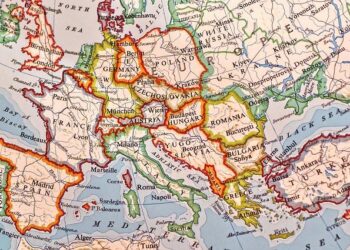Introduction
Recently, a controversial agreement has emerged between North Macedonia and the United Kingdom, igniting debates about the establishment of migrant processing centers in the Balkans. This initiative is part of the UK’s thorough strategy to manage migration and aims to create facilities for asylum seekers within North Macedonia. However, this plan has raised significant concerns among local communities and human rights advocates. Critics fear that such an initiative could exacerbate tensions in a region already grappling with considerable economic and social challenges. As discussions surrounding the logistics and ethical implications of these centers unfold, attention remains on how this will impact North Macedonia’s stability and its relationships with European Union member states.
North Macedonia-UK Collaboration Raises Concerns Over Migrant Processing Facilities
The recent partnership between North Macedonia and the United Kingdom to establish migrant processing facilities has sparked widespread concern among human rights organizations as well as local populations. Opponents argue that this collaboration may worsen existing issues related to migration management in the Balkans. While aimed at expediting asylum seeker processing,it raises critical questions regarding how individuals will be treated within these facilities,especially concerning their rights and overall welfare.
Local non-governmental organizations (NGOs) and advocacy groups have voiced serious apprehensions regarding the potential ramifications of these centers, emphasizing several urgent issues:
- Living Conditions: Concerns about whether these facilities can adequately support vulnerable populations.
- Legal Rights: The necessity of ensuring that migrants’ legal protections are upheld throughout bureaucratic processes.
- Community Impact: Fears that local resources may become overstretched, affecting both migrants’ needs and those of residents.
The rising discontent is evident through public protests reflecting opposition against establishing these centers. Stakeholders are now calling for greater openness and dialog between authorities and community members to ensure respect for all individuals’ rights.
Impact on Local Communities and Resources Amidst Disputed Migration Policy
The implementation of this contentious migration policy involving North Macedonia and the UK has raised substantial concerns regarding its effects on local communities. Many residents worry that setting up migrant processing centers could further strain already limited resources such as housing, healthcare services, and educational institutions. As communities prepare for an influx of asylum seekers, there are fears over potential increases in tension surrounding access to essential services. Local authorities face a challenging task: balancing humanitarian responsibilities while ensuring existing residents do not suffer from resource depletion.
This situation is further complex by potential shifts in socio-political dynamics across the region due to increased migrant presence. Citizens have expressed their safety concerns through various channels including social media platforms as well as public forums. The introduction of new social programs aimed at integrating migrants could either foster community cohesion or deepen divisions based on how effectively they are implemented.
Key impacts might include:
- Resource Allocation: Increased demand for public services leading to possible shortages.
- Cultural Integration: Opportunities for enriching cross-cultural interactions if managed effectively.
- Civic Safety: Community perceptions surrounding safety levels amidst demographic changes.
Expert Recommendations for Effective Management Strategies Supporting Migrant Integration
The evolving landscape surrounding the agreement between North Macedonia and the UK highlights experts’ calls for robust support systems prioritizing migrants’ welfare during integration processes.
To facilitate successful assimilation into society, specialists recommend adopting a comprehensive approach encompassing several key components:
- < strong > Cultural Orientation Programs: Initiatives designed to educate newcomers about local customs can foster mutual understanding among diverse groups.
- < strong > Language Support Services: Accessible language training opportunities can significantly enhance dialogue skills necessary for effective integration into host communities.< br />
- < strong > Employment Support: Creating pathways facilitating skill assessments alongside job placements encourages businesses’ engagement with migrant labor forces.< br />
- < strong > Legal Assistance: Ensuring access points where migrants receive legal advice concerning their status helps uphold their rights within host nations.
< / li >
< / ul >Additionally , fostering collaborations among governmental entities , NGOs ,and community stakeholders proves vital towards enduring management . A cooperative framework enables tailored strategies addressing both immediate necessities alongside long-term objectives benefiting all parties involved.Experts advocate formingcommunity liaison committees to bridge communication gaps connecting locals with newcomers . This structure might include :
Committee Role Description < td >< string >> Facilitator : Â < / table >
< / div >
> Conclusion: Key Insights from Recent Developments
In conclusion ,the recent accord struck between North Macedonia along with United Kingdom concerning establishment migratory hubs initiates complex dialogues around managing migration effectively across Balkan territories . While offering immediate solutions targeting immigration issues faced by Britain ; it concurrently raises profound inquiries relating human dignity ,local resource allocation along with long-term societal ramifications impacting Macedonian culture itself .
As stakeholders navigate through contentious waters ahead ; voices emerging from affected neighborhoods must remain prominent throughout policymaking processes moving forward .
With Europe observing closely ; repercussions stemming from this deal likely extend beyond Macedonian borders influencing future regional policies governing migrations altogether .Policymakers should proceed cautiously balancing security imperatives against humanitarian commitments ensuring every individual’s dignity remains central focus driving efforts forward .
ADVERTISEMENT















